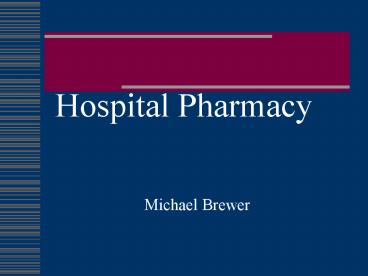Hospital Pharmacy - PowerPoint PPT Presentation
1 / 15
Title:
Hospital Pharmacy
Description:
They get overtime if they work extra shifts, but not if they just have to stay ... the typing, counting, pouring, licking, and sticking dispensing tasks associated ... – PowerPoint PPT presentation
Number of Views:2052
Avg rating:3.0/5.0
Title: Hospital Pharmacy
1
Hospital Pharmacy
- Michael Brewer
2
Wages
- Salary range for a new staff pharmacist is
80,000 - 92,000. Salary not hourly. - They get overtime if they work extra shifts, but
not if they just have to stay late at the end of
a shift. - For example, if they are scheduled to get off at
5pm one afternoon, but they have to stay until
6pm for some reason they dont get any extra pay.
On the other hand, if they come in an extra day
to cover for someone who is out sick they would
get paid for overtime.
3
Wages cont.
- They do have an 18 shift differential for people
that work from 5pm to 5am. - They get a 35 increase for holiday pay on the 3
major holidays New Years, Christmas, and
Thanksgiving. - Incentives they dont get any bonuses, but they
do get a parking spot if they are Employee of the
Month.
4
Benefits
- They do have Social Security and Workers
Compensation benefits. - No unemployment insurance as far as the
pharmacist that I talked to knows, and he hopes
to never have to find out.
5
Pensions
- They do have the option to participate in a
403(b). It is a tax deferred account the employee
can put money into, but the employer doesnt
match or contribute anything. - They do not have any profit sharing opportunities.
6
Insurance
- They get life, medical, dental, and disability
insurance. - Vision insurance is available, but not automatic.
- There is a 20 copay
- For prescriptions, the employee or employees
family can get them for cost if it is less than
their copay. - The hospital does cover supplemental insurance,
but most people get their own policy also.
7
Time off
- They earn 8 hours of paid time off (PTO) for
every 80 hours you work. - They start accumulating this as soon as they
start working, but they dont get to take any of
it for the first 6 months of employment. - All the different types of PTO are lumped
together into this one account.
- Examples of PTO
- Vacation
- Sick days
- Personal days
- Bereavement
- Jury duty
- Military duty
8
Time off cont.
- Holidays are only paid if they work them, and
they get the shift differential mentioned
earlier. - Pharmacists rotate working the holidays. Each
pharmacist has to work one of the holidays, but
they rotate years. For example, if one pharmacist
worked Christmas this year that pharmacist would
get off Christmas the next year and work one of
the other holidays. - Lunch/Dinner are semi-paid. The shift is 10.5
hours, they only get paid for 10, but they get an
hour lunch/dinner break.
9
Professional Organizations/Memberships
- Memberships in professional organizations are not
paid for by the hospital. - Supervisors get time off with pay to attend
professional meetings, but staff does not. - Neither enrollment fees for nor travel to
professional meetings are paid for by the
hospital.
10
Miscellaneous
- Professional growth opportunities include
becoming part of the clinical staff, and the
ability to move into management. - They do have a Credit Union.
- Schedules are pretty flexible, and can vary from
person to person. - For example, some people work 7on/7off, others
work strictly day shift.
11
Residencies
- Residencies can be helpful, but are not required
at this time for a hospital job. This may change
in the not so distant future, because AHSP is
pushing for it. - Residencies are a very good idea if a person
wants to become specialized in a certain area or
a clinical coordinator.
12
Quality of Life
- They dont have to take their work home with them
like they would if they owned their own pharmacy. - When they get off at the end of their shift, they
can leave everything there until their next
shift, and enjoy their time off. - The work pace fluctuates throughout the day, with
the most busy times being in the morning and
around mid-day when the doctors are rounding.
13
Pros of Hospital Pharmacy
- You get the clinical aspect of pharmacy as
opposed to just the typing, counting, pouring,
licking, and sticking dispensing tasks associated
with retail pharmacy. - You get to work closely with other healthcare
professionals within the hospital, which gives
you more of a team concept of the healthcare
system.
14
Pros of Hospital Pharmacy cont.
- Workflow isnt as hectic as it is in retail
pharmacy. There is down time during the day, but
there is enough to do to keep you busy so the day
doesnt drag on forever.
15
Cons of Hospital Pharmacy
- There are a lot of rules and regulations from
different governing bodies and organizations that
can sometimes seem to hinder patient care. - The hospital, and therefore pharmacy, never
closes. Somebody has to be there at all times no
matter the circumstances (holidays, bad weather,
etc).































